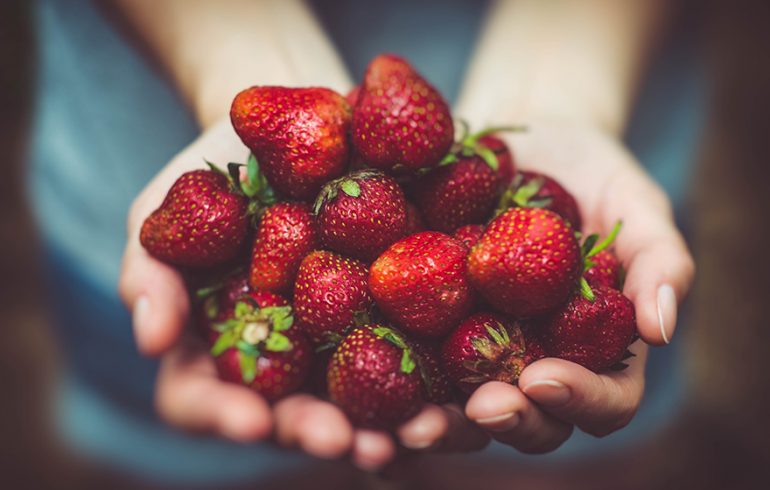Vitamin C, also known as ascorbic acid, is an essential micronutrient and antioxidant. It’s especially important for synthesizing collagen. By getting enough vitamin C every day, we’re supporting our body’s essential tissues and preventing some of the common signs of aging due to the break-down of collagen, such as wrinkles, joint degeneration and osteoporosis.
It’s recommended that older adults take 100-120 milligrams (mg) of vitamin C per day (140 mg per day if you’re a smoker) to support normal body demands.
Eating nutrient-dense whole fruits and vegetables is the best way to meet the recommended daily intake. This may involve striving to eat more broccoli, brussel sprouts, rose hips, parsley and citrus fruits, in addition to the fruits and vegetables listed below.
9 Food Sources of Vitamin C
1. Strawberries

When we think of getting our vitamin C, we typically focus on citrus fruit. In fact, strawberries are an equally potent source of this powerful antioxidant. One cup of strawberries provides 149% of our daily vitamin C requirement.
2. Peaches

Peaches are a good source of vitamin C with a medium-sized peach containing about 17% of our daily recommended intake. Peaches are also low in carbohydrates. Getting enough vitamin C every day while lowering your intake of carbs can help keep wrinkles and dryness at bay.
3. Nectarines

When we sink our teeth into a nectarine, we’re getting plenty of vitamin C, beta-carotene and fiber.
4. Pomegranate Seeds

Technically known as arils, these juicy ruby kernels are bursting with vitamin C and flavanoids that help keep your heart, brain and blood vessels healthy. Although extracting the seeds from the fruit can be a bit of a chore (and a messy one at that), many grocery stores now sell containers of fresh ready-to-eat arils. Sprinkle them over oatmeal, yogurt, mixed fruit and salads, or press them lightly onto a soft cheese and spread on toast or crackers.
5. Lemons

Lemon water is a great way to get a quick hit of two essential nutrients: potassium and vitamin C. The juice of half a lemon contains a total of 12 calories, 112 mg of potassium and 44 mg of vitamin C. To reap the nutritional benefits, the key is to squeeze the juice out of a lemon rather than simply tossing a lemon wedge into your glass.
6. Corn on the Cob

Corn has an undeserved reputation as a fattening, carb-laden, genetically altered food. Add to that its association with high-fructose corn syrup and you may find yourself wondering if corn on the cob deserves a place at your picnics this summer. The truth is, older adults can — and should — indulge in this seasonal favorite guilt-free. Corn on the cob contains vitamin C and B6, as well as potassium and magnesium, which prevent heart disease.
7. Radishes

A 1/2 cup of radish bulbs has just 16 calories and contains about 25% of the recommended daily intake of this all-important vitamin. And don’t toss those radish greens. They’re just as edible as the root. Like all leafy greens, radish greens are a source of calcium, vitamin A and — you guessed it — vitamin C.
8. Red Bell Peppers

One cup of chopped red bell peppers contains 190 mg of vitamin C, three times more than an orange.
9. Kale

There are a lot of compelling reasons to add this rich leafy green to your diet. One cup of raw kale contains 80 mg of vitamin C, 134% of the daily recommended intake. Research shows that eating this cruciferous vegetable may also help control diabetes, protect against age-related eye disease, keep inflammation at bay and strengthen your bones. Kale chips, in particular, are packed with dietary fiber, vitamin K and omega-3 fatty acids that aid in controlling blood sugar levels. They’re also low in calories and carbohydrates.



